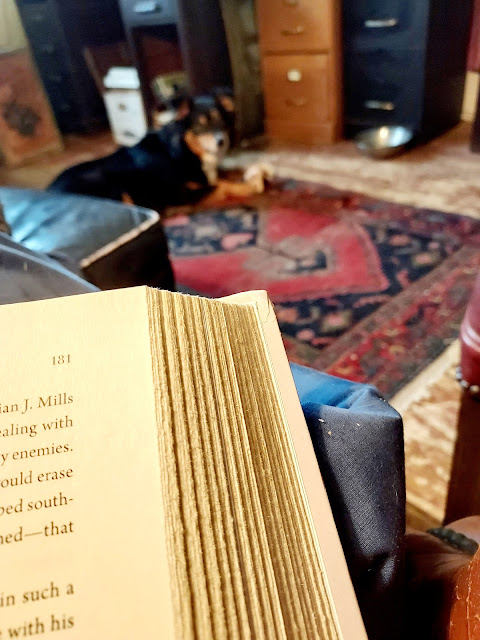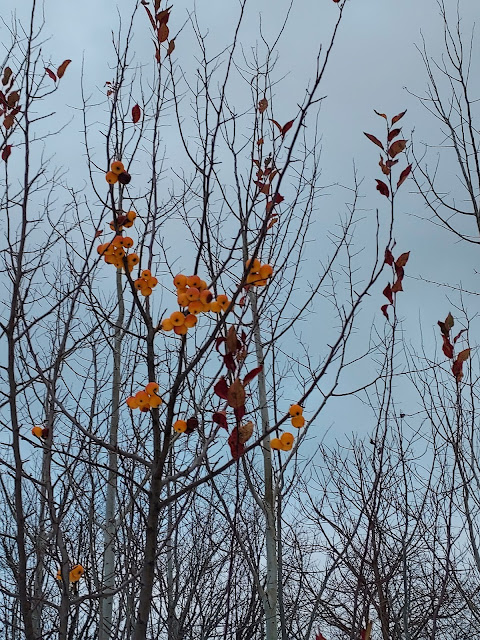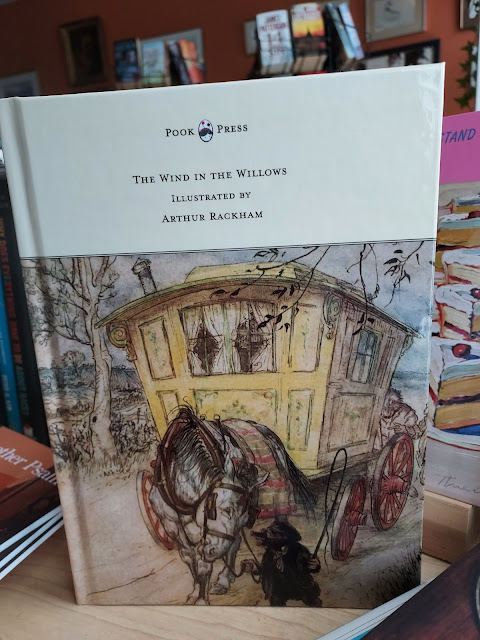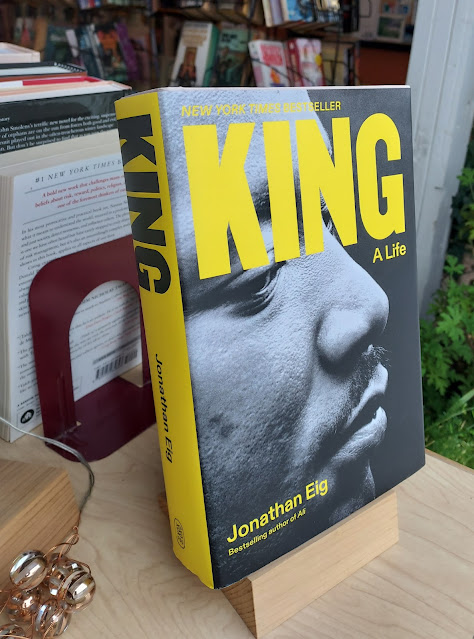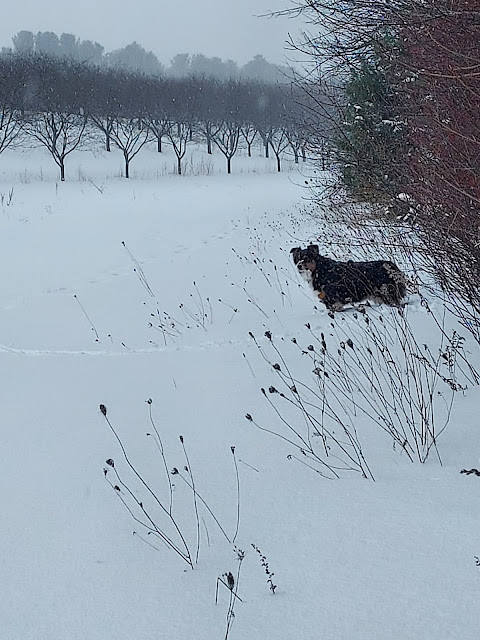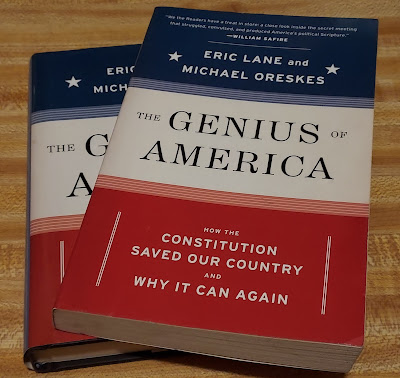 |
| On Waukazoo Street in Northport, Michigan |
First, some bookshop news and blog notes:
Reminder: Dog Ears Books is open four days a week this winter, Wednesday through Saturday, from 11 a.m. to 3 p.m.
Reminder: you can order audio books through Libro.fm and choose Dog Ears Books as your bookstore on the Libro.fm site, and we will earn a little something from each audiobook you buy that way. It will help us get through the winter. Thank you!
Blog note 1: This blog, Books in Northport, has been around since September of 2007. It has always been free and will be free as long as it survives. I make my living as a bookseller, not as a blogger. Neither will I be moving to a Substack account, although many professional writers and independent journalists are there now, and I encourage you to follow a few, upgrading to a paid subscription if you can afford it, especially those whose work is crucial to giving us real news, e.g., Dan Rather, Heather Cox Richardson, and others. The importance of these sources will increase sooner than you might imagine.
Blog note 2: Call my blog a “labor of love” or call me a graphomaniac – however you want to characterize it and/or me, I’ve stuck to this project for over 17 years. Some of you have been with me from the beginning, while others are brand-new readers, but I appreciate every single one of you, however long you have been reading. My morale this year, however, could use a little extra support (I’ll be trying to provide support for the morale of my readers, too), so I encourage you to (1) sign on as a follower, (2) comment on posts, and (3) send links to your family and friends for posts you find particularly meaningful. There is no financial advantage to me in this, only personal satisfaction.
That’s it for bookshop hours, audiobooks, and blog! Now, for some book thoughts --.
 |
| Still relevant! |
George Orwell’s dystopian novel 1984, an “instant classic,” first appeared in 1949 and hung over us like the sword of Damocles for 35 years. When the fateful year of his title passed, we in “the real world” heaved a sigh of relief. It didn’t happen! We’re still free! Did we then become complacent? Oh, gripes about government continued, with “Big Brother” now used as an epithet. It took until 2019 for worry about corporations keeping tabs on us to start catching up with worry about government. In 2023 concern over corporate surveillance surpassed the worry about government.
Where are we now? Is Big Brother watching us? Follow-up question: are Big Government and Big Corporations separate?
In Orwell’s novel, was the fictional Big Brother an individual modeled on Stalin or a figurehead personifying the ruling party of the totalitarian state? Follow-up question: Does it matter?
In the novel, there is no life of significance without Party membership, and for Party members there is no such thing as private life, as they are frequently reminded by ubiquitous posters and ever-on telescreen messages: “Big Brother is watching you.” Is it ironic or just pitiful that Americans in the 21st century have not waited for the government to install telescreens in homes but rush to put their own personal lives online in videos for all the world to see, even grooming their toddlers as video stars? Follow-up question: How will that play out in the future of those children?
Admittedly, this blog of mine has not been restricted to book reviews and bookshop news, and over the years I’ve shared quite a bit of my personal life, from photographs of my dogs to an account of my husband’s death and my cross-country trip home to Michigan without him. It's been kind of a memoir in installments. (This blog is not AI-generated. I am a real person, as well as a live bookseller.) I do, however, maintain a degree of privacy and intend to keep it that way.
 |
| January 30, 2025, Up North |
However, back to the book --.
Winston, the protagonist in 1984, lives in constant uncertainty and fear. He doesn’t have to worry that he is breaking the law because there is no law! There are only bad thoughts. But if he is suspected of having them (as we pretty much know from the beginning he will be), there will be no possible defense. He is guilty when accused, accused because guilty, and all that remains is for him to confess and name names, specifically the name of his lover, since he is not supposed to have a private life. But no, that’s not all he has to do. He can’t just give a name. He must be broken.
We Americans in 2025, forty-five years after the date Orwell's book predicted world totalitarianism, can keep our lives relatively private if we choose to stay offline and buy local with cash. All of us can do our best to seek truth and hold onto it in a whirlwind of public lying and stories that change from one hour to the next. Certainly we can ration our viewing of “reality” videos and so-called “news,” even completely unplugging for days at a time.
All that done, even so, it’s hard to live in a country whose leaders have turned their backs on law.
When, as now, in the last week and a half, the rules change day by day … and people appointed or elected to run government are not restrained by laws or held accountable for breaking them … and individuals formerly in positions of authority are persecuted because they believed in and followed laws and testified against law-breakers … then, with or without constant surveillance, with or without thought police continually monitoring our posture and facial expressions, we have been taken hostage by the world of 1984.
And yet--. And yet--.
This morning on a back road I came upon a pickup truck that had run off the road and was half-buried in deep snow, and a little way up the road a man was walking. “Is that your truck? Do you need a ride?” He did.
In the afternoon the sun came out and shone for hours, and our cold northern Michigan world was so beautiful. Shadows on snow are so beautiful! Sun on snow is so beautiful!
We can still help each other and see beauty in the world, and each one of those small moments is important. Each such moment is resistance to tyranny.
In the wake of the Wednesday night air tragedy that resulted in the loss of 67 lives, the Blamer-in-Chief wasted no time in pointing the finger—in an absurd direction, naturally. It is his way. He does not want Americans to come together, either in joy or in sorrow and certainly not in understanding and love and mutual aid. Instead he wants all eyes fixed on him, his followers’ eyes in endless admiration, his opponents’ eyes filled with fear. He incites hatred, constantly whipping up frenzies as Americans with different agendas consider each other from across the political and moral chasm he keeps digging, very intentionally, deeper and deeper. He’s got the whole country in a dire game of the prisoner’s dilemma, and as long as he can keep us from joining together, he will keep pulling the strings and jerking us off-balance.
I must believe more people will finally see his naked narcissism and incompetence when it begins to affect their lives--although when hardships fall on MAGA families, of course he will tell them it’s someone else’s fault. It’s always someone else’s fault. President Harry Truman’s famous motto was “The buck stops here.” In the DJT White House, the buck doesn’t have time to catch its breath before it's thrown in someone else’s face. And it’s hard not to react to the absurd nonstop blaming with anger, but we cannot live every waking moment in outrage. It’s important to deny the Blamer his childish satisfaction. It’s also important for us to continue to love each other and love the world, our poor, broken world.
What helps you remain hopeful about our ability to heal the world? What strategies do you have to contribute to healing yourself and others? For putting the pieces back together again? To mend the world?




